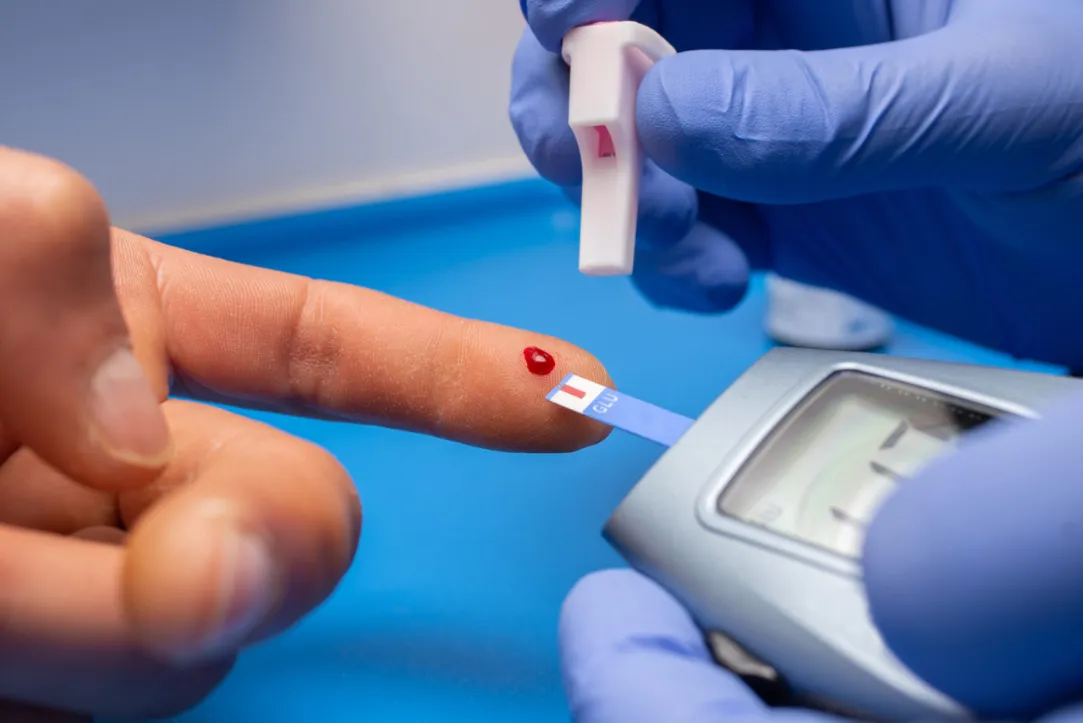Diabetes can lead to serious wound complications. Learn more about how to manage and treat diabetic ulcers with our specialized care.
Wound care for diabetics requires special attention due to the increased risk of complications like infections, slow healing, and the development of chronic wounds. People with diabetes often face issues like reduced blood circulation, nerve damage (diabetic neuropathy), and weakened immune function, all of which can negatively affect wound healing. Here’s what you need to know to manage and care for wounds effectively if you or a loved one has diabetes:
1. Early Detection and Daily Inspection
- Daily Skin Checks: Inspect your skin every day, especially your feet and lower extremities. Use a mirror if needed or ask for help to check areas that are hard to see. Look for cuts, blisters, sores, redness, swelling, or other changes.
- Address Wounds Immediately: Even small cuts or blisters can become serious if not treated right away. Seek medical advice if any wound appears slow to heal or shows signs of infection.
2. Proper Wound Cleaning
- Gentle Cleaning: Clean the wound daily using mild soap and water or saline solution. Avoid using harsh antiseptics like hydrogen peroxide or iodine, which can damage healthy tissue and slow healing.
- Pat Dry: After cleaning, gently pat the wound dry with a clean cloth or gauze to prevent further irritation.
3. Moist Wound Healing
- Dressings: Keep the wound moist but not soggy. Use appropriate dressings that retain moisture to promote faster healing. Your healthcare provider may recommend hydrocolloid, foam, or alginate dressings depending on the type and severity of the wound.
- Regular Dressing Changes: Change dressings regularly, as directed by your healthcare provider. Keeping the wound covered helps prevent infections and promotes a more favorable healing environment.
4. Prevent Infection
- Signs of Infection: Be alert for signs of infection such as increased redness, warmth, swelling, pus, foul odor, or fever. If any of these symptoms appear, contact your healthcare provider immediately.
- Antibiotics: If the wound becomes infected, you may need a course of antibiotics, either topical or oral, depending on the severity.
- Tetanus Shot: Ensure your tetanus shot is up to date, especially for deep or contaminated wounds.
5. Offload Pressure from Wounds
- Avoid Pressure on Wounds: For foot wounds, avoid walking on the affected area as pressure can exacerbate the wound and delay healing. Use offloading devices such as special shoes, crutches, or braces to relieve pressure.
- Foot Care Devices: Orthotic devices, custom shoes, or padding can prevent pressure ulcers and reduce the risk of wounds from returning.
6. Control Blood Sugar Levels
- Monitor Blood Glucose: Proper diabetes management is key to promoting faster wound healing. Keep blood sugar levels within the recommended range, as high blood glucose can impede the healing process and increase the risk of infection.
- Medications: Follow your prescribed diabetes treatment plan, including medications, insulin, and lifestyle changes. Uncontrolled diabetes can significantly slow wound healing.
7. Nutrition and Hydration
- Eat for Healing: A diet rich in protein, vitamins (especially vitamin C and vitamin A), and minerals (like zinc) helps the body repair damaged tissue and promotes healing. Consult a dietitian if needed for a diabetes-friendly meal plan that supports wound care.
- Stay Hydrated: Proper hydration is essential for maintaining skin elasticity and healing. Drink plenty of water unless otherwise advised by your healthcare provider.
8. Foot Care for Diabetic Patients
- Regular Foot Exams: Schedule regular foot exams with a podiatrist or healthcare provider. They can spot early signs of ulcers or other issues before they become serious.
- Proper Footwear: Wear well-fitting, protective shoes that prevent blisters, cuts, and calluses. Avoid walking barefoot, even indoors, to reduce the risk of injury.
- Moisturize the Feet: Keep your feet moisturized but avoid putting lotion between the toes, where excess moisture can lead to fungal infections.
9. Manage Neuropathy
- Address Nerve Damage: Diabetic neuropathy (nerve damage) can cause loss of sensation, making it difficult to notice wounds or injuries. Working with your doctor to manage nerve damage can help prevent wounds from going unnoticed.
- Prevent Injuries: Avoid exposing your feet to extreme temperatures or potential sources of injury, such as sharp objects or rough surfaces.
10. Use of Advanced Wound Care Therapies
- Hyperbaric Oxygen Therapy (HBOT): This treatment involves breathing pure oxygen in a pressurized chamber, increasing oxygen levels in the blood and promoting faster wound healing for non-healing diabetic wounds.
- Negative Pressure Wound Therapy (NPWT): A vacuum-assisted closure system can be used to remove excess fluids from the wound and promote healing by increasing blood flow to the area.
- Growth Factors and Skin Substitutes: Some advanced treatments may involve applying growth factors or bioengineered skin substitutes to the wound, encouraging faster regeneration of skin tissue.
11. Consult with a Wound Care Specialist
- Seek Professional Help: If your wound isn’t healing or you develop a chronic wound (such as a diabetic foot ulcer), it’s important to consult a wound care specialist. They can evaluate the wound and develop a comprehensive treatment plan.
- Regular Follow-Up: Ongoing follow-up appointments are important for monitoring wound progress and adjusting treatment plans as needed.
Conclusion
Diabetics must take special precautions to prevent and manage wounds. Early detection, proper cleaning, moisture control, and infection prevention are crucial steps. Additionally, managing blood sugar levels, offloading pressure from wounds, and maintaining good nutrition can help promote healing and prevent complications. Regular consultations with healthcare providers and wound care specialists are essential to ensure optimal wound care.


